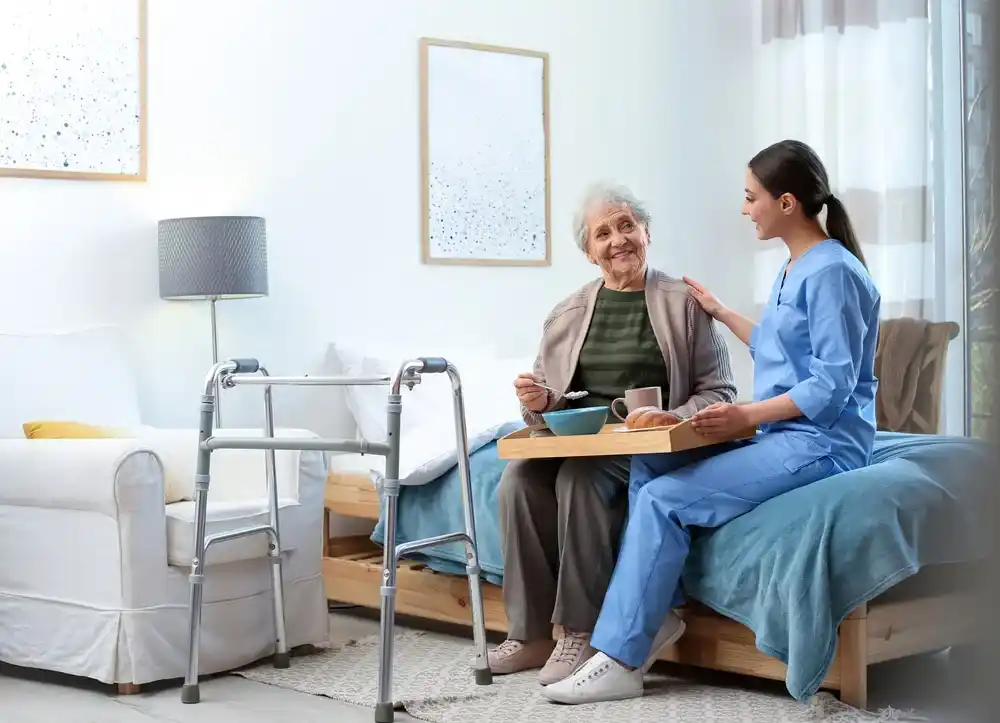When faced with medical challenges at any stage of life, we call on experts for guidance and support. The end-of-life journey is no different, and specialists in hospice care are the best source for advice and assistance.
Many people in Cincinnati have the wrong idea of what hospice is – and one of the biggest misconceptions is the belief that hospice is a place. This isn’t the case.
Hospice is a concept of care for the incurably ill, and the sole focus is quality of life. As such, we may speak of people going into hospice, but no one has to leave their home. Services are provided wherever a patient resides, whether that’s an assisted living facility, a residential care complex or a private home.
 What is In-Home Hospice Care?
What is In-Home Hospice Care?
In-home hospice services are designed to improve patient comfort at the end of life. Care is provided by an interdisciplinary team of skilled professionals, who formulate a plan to address each patient’s physical, mental, emotional and spiritual needs.
Four levels of hospice services – routine home care, respite care, continuous home care, and in-patient care — are available to terminally ill patients.
Medicare and Medicaid benefits cover all four, as do most private insurance plans, and patients may move in and out of the different levels as their needs change.
Upon entering hospice, patients usually start with routine home care. Plans vary, but here are some of the common services provided:
- Home medical equipment, medications, personal supplies, and 24-hour access to nursing support
- Scheduled visits from a registered nurse, who manages the plan of care and makes any necessary adjustments
- Regular support from nursing assistants, home health aides, therapists, social workers, and spiritual advisors
- Bereavement counseling to help the patient and family work through the grief of receiving a terminal diagnosis
If routine home care becomes unsuitable, support can come in other ways:
Respite care is available for family members who need a break. The patient can stay at a Cincinnati nursing facility for up to five days, giving their caregivers time to recharge.
Continuous home care offers short-term, in-home support from a registered nurse. This level of hospice care is meant to deal with a medical crisis, and once the patient’s condition is stabilized, services often revert back to the routine level.
In-patient care is for serious health concerns that cannot be adequately addressed in the home setting. At this time, the patient is moved to a hospital or hospice facility for around-the-clock attention. When stabilized, they can return home for routine care.
Benefits of In-Home Hospice Care
With in-home hospice care, services are tailored to meet the needs of each patient. Receiving support at home allows people to enjoy a better quality of life, and that’s what hospice is all about. Some of the benefits include:
- Familiar surroundings – Patients who receive in-home hospice care are able to live as normally as possible, and the comforts of home can be priceless for those with incurable conditions.
- Quality time – At the end of life, creating additional memories with loved ones is what matters most. With hospice care at home, there are more opportunities for families to bond and spend time together.
- Important supplies – When a patient needs a hospital bed, medication, oxygen, incontinence products or other items related to their care or condition, they may be delivered by the hospice provider.
- Expert care – A diverse team of trained professionals provides support to patients who choose in-home hospice services. As all of their needs are being met, this ensures the best possible quality of life.
- Regular routine – As members of the hospice care team visit patients on a regular basis, unplanned trips to the hospital are less likely. This allows families to create a schedule that isn’t taxing.
- End-of-life advice – Hospice care providers understand the end-of-life journey like no one else. Patients and their families have an expert source for information on what to expect next and how to move forward.
- Family support – Coping with a loved one’s incurable illness can be incredibly challenging. Hospice services include supportive counseling by chaplains and bereavement coordinators both before and after death.
Our In-Home Hospice Care Available in This Area
If a loved one has been diagnosed with an incurable condition, you may have a difficult path ahead of you. Calling for hospice care isn’t giving up – it’s a smart step to take. And contrary to popular belief, a person doesn’t have to be in their final days to receive hospice services. Anyone who has a terminal illness and a lifetime prognosis of six months or less is eligible, and it makes sense to take advantage of the benefits early on.
Not everyone opts to enter hospice care, but your loved one should have the choice – and once they realize that they can get the care they need while living out their days in their own home, it may be an easy decision.
For more information on in-home hospice care services in Cincinnati, or to schedule a consultation, contact Suncrest Hospice today.

